Most people will assume that in this great land, known as the USA, that you would be free to go camping in your backyard or that of a family member or friend. But is this true? Hardly.
Living full-time in your RV is possible, however, there are many rules, regulations, and considerations you should understand. Nobody wants to invest time and money prepping land to accept RV connections, then have officials say you can’t live in the RV or you must remove it from the premises.
So how can you find out if camping in your backyard is legal?
Keep reading! In this guide, I will discuss the laws that govern RV parking, places where long-term RV parking is okay, and ways to skirt the issue when you have nowhere else to go. I will also look at the things you may miss when you park your camper in your backyard.
RV Parking Laws
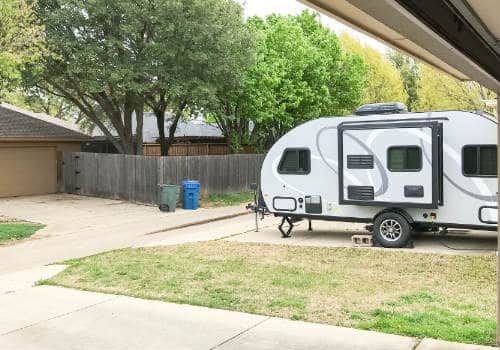
Recreational vehicles are built with the sole purpose of recreational use. They are not made to be a permanent home, so federal housing laws do not apply to them. When that same RV becomes a permanent fixture, things begin to get dicey.
Some people, depending on location, can get away with years of peaceful full-time RV living on their personal property, while others find themselves in hot water right away.
There is no rhyme or reason to many laws that pertain to living in your RV, but I will do my best to break the main ones down for you.
In this next section, I will go into more detail about the HUD (United States Department of urban housing development) regulations that had many permanent RVers uneasy a few years back. I will also discuss the zoning laws you may encounter during your journey to becoming a landowner who parks and lives in their RV full time.
The HUD Scare
In 2016, there was an explosion of postings on RVer and tiny home online forums and talk amongst full-time RVers that HUD was making it illegal to live permanently in such a structure.
This news brought plenty of stress to those living under such conditions, and those who had a dream to begin a tiny home or RV living full time.
HUD did change some language in their regulations, but the reality was that prior to this 2016 update to the HUD rules, it was already illegal to live in an RV. HUD regulations state that RV design is for recreational use and not meant as a primary home for continuous occupancy.
So why did they need to redefine the regulations? The popularity of RV and tiny home living had many cities dealing with an influx of RVs and miniature homes on wheels on private property with people living inside them permanently.
Were these structures a home under HUD rules or were they temporary housing? This clarification was important so officials could update local zoning laws to deal with this issue.
The original regulations for RVs did not include those larger than 400 square feet. With the increase in the size of some fifth-wheels and park model recreational vehicles that were exceeding the 400 square foot barrier, the RV manufacturing industry would need such clarification to keep all recreational vehicles exempt from Manufactured Home regulations enforced by HUD.
Along with the newly built RVs and park models, many typical motorhomes and fifth-wheel campers were building patios, decks, or screen porch extensions onto their camper. These additions exceed the original 400-square-foot limit on living space and make it appear they are turning their camper into a full time domicile.
The HUD summary explains the need for clarification within the housing classifications between an RV, a manufactured home, and a standard house.
HUD’s proposal would define a recreational vehicle as a factory-built vehicular structure with a design for recreational use only and not for use as a permanent residence. They still must get certification after manufacture to be in accordance with either the American National Standards Institute recreational park trailer standard or the National Fire Protection Association recreational vehicle standards.
For those who own or are thinking of buying a tiny house built on a trailer, the standards by which it’s made will determine if it’s an RV or a permanent structure safe for continuous occupancy. The new proposal dictates that if a tiny house is built to NFPA or ANSI standards, it’s an RV and will face local zoning law regulations as such.
Depending on your situation, this could be a good or bad thing. If you have an RV, you cannot legally live permanently in it in most areas of the country. If they certify your tiny home trailer as a house, local building code regulations will apply to how and where you can park.
In this new proposal, HUD and the RV industry agree that the main distinction will remain that manufactured homes are built to be a permanent residence while the basis of RV design and building standards are for families to use them for recreational, camping, or seasonal accommodation only.
As long as the RV industry builds to the nationally-recognized RV standards, modern RVs will not fall under HUD’s jurisdiction, which eliminates HUD from becoming an issue for you living on your own land in your recreational vehicle for a short period.
So if you plan to live fulltime in your RV what else will impact your ability to park on your property? Local zoning laws.
The next section is the biggest roadblock to parking an RV on your property, so knowing what to look for and the correct questions to ask will make this formidable task a bit easier.
Zoning Laws
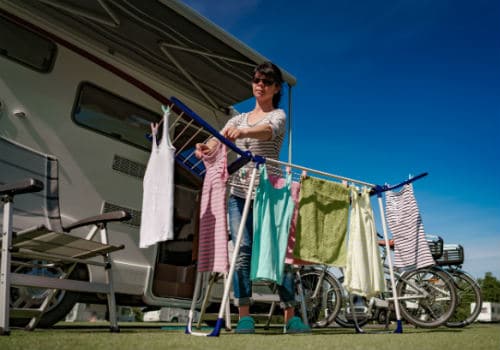
In almost every US community where zoning laws exist, they will consider RVs a temporary shelter meant for only 30 consecutive days or less of occupancy.
If your land isn’t zoned for recreational vehicle living, then it’s illegal for you to live in your camper on the property.
For those of us who desire to enjoy the freedom and simplicity of the RV lifestyle and not be held hostage at the expense of a stick-built home, this inability to park and be camping in your backyard seems unfair.
Many people don’t even think about the rules that may apply to their RV residence like I did when I thought living on my daughter’s land would be cool. There is a difference between urban and rural RV living zoning laws, so let’s get into that now.
Rural Parking
When I first began my full time RV journey, I knew I would like to spend several months a year on my daughter’s 5-acre property in rural North Carolina. My son-in-law made a pad, and I paid for 30-amp electrical service to the pad. He also ran a water line, and the plan was for me to ferry my sewer tank waste in a portable honey wagon to the main sewer line for disposal.
We did this and never once took the time to consider if it was even legal in their state and county. We use the pad for months at a time each year (well over the 30-day occupancy rule), and never once did anyone bat an eye about the situation. But we were in a relatively remote location, far from the prying eyes of county officials.
I think this is the most common scenario for people camping in their backyard. They assume they have a right to do whatever they want and when no one confronts them about it, they continue to do so.
When I finally took a peek at the local zoning laws about RV parking, I found that this particular county groups mobile homes together with campers and RVs if the owner intends to use them as a full-time residence.
By doing this, it requires anyone wishing to place a long-term camper on any property within the county to get the same permits and pass inspections as if you had a mobile home. You would need checks for proper electrical, water, and sewer hookups, as well as good drainage.
I’ll be honest, this sounds like it’ll cost more money than I wish to spend and be a hassle for my daughter, so, for now, we’ll let the current situation ride. What I am doing is not necessarily illegal, but without the permits certainly not up to “code.” The worst-case scenario is we get caught and are told to leave, and my daughter has to cough up a fine since the work was on her land.
I am not indicating that you can park an RV on private property in any rural area with no problems, but that it may take much longer for any county official to notice.
Urban Parking
You need to take great care when parking your RV on property in an urban setting because most metropolitan areas do not allow full-time motorhome or travel-trailer living within city limits.
Many urban zoning regulations forbid living in a vehicle, which most officials consider an RV to be. Depending on location, you may not even be able to park a vacant RV on your land.
Urban areas tend to have strict housing ordinances, and they aren’t afraid to enforce them. Neighbors are much closer, and they may not feel comfortable with RV dwellers “bringing down” the neighborhood.
If they complain, you could find yourself with substantial civil violation fines and a requirement to remove the RV from your property. If your area has an HOA, they will most likely have even more strict rules for RV parking above and beyond county zoning rules.
Options for Camping in Your Backyard
If you have a dream of living in your RV on your own piece of land, don’t give up. The first step is to research the local laws where you already own property, or in an area you would ultimately love to settle down.
You could be lucky and find that you may need to pay for some permits to legally live in your RV.
You may be unlucky and find that location after location will only allow you to be camping in your backyard for a short period while you build a permanent structure.
So what other options are there?
There are places you can own a piece of property that will allow you to live in your RV like permanently:
- RV Co-op parks
- Neighborhoods with RV allowances
- Rural land zoned for homesteading
RV Co-Op Parks
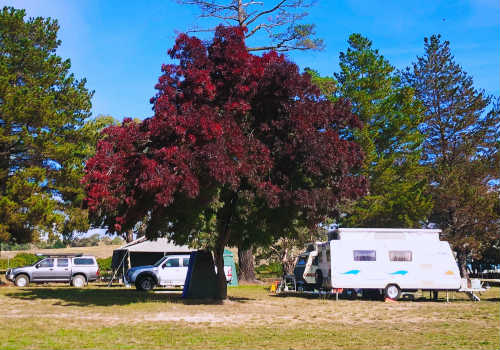
The easiest route to owning land that you can place your RV to live permanently is to look into purchasing a lot in an RV Co-op.
For example, an Escapees park lets you purchase a lot for life. You have the convenience of all the necessary RV hookups like water, sewer, electric, and cable already in place. You may also have seasonal activities to join in on, and amenities like your own small outbuilding or shed. The park may also have a pool or fitness center on site.
The negative aspects of going this route are that your neighbors are close, just as they would be in a campground. Your site may be quite small, with only enough room for your RV and a car or two. You can also expect to pay quarterly dues for maintenance or may have so many hours you must volunteer for general upkeep.
I have several friends who have gone this route and love it. If you don’t like yard work, having a small piece of land can be ideal.
Neighborhoods with RV Allowances
When you want more space to spread out, there are places around the US that have neighborhoods that are zoned to allow RV living. These lots have all the RV connections either already in place, or permit them to be put in with no fuss.
There is a subdivision in Alabama that has two sections that allow full-time RV parking. You can purchase a lot with only RV connections, a double lot with a park model on one and an RV spot on the other, or a lot that is still fully wooded.
The lots in this neighborhood (as of early 2019 ) run between $30-50 thousand, with low taxes, and quarterly HOA dues of around $225. They have a pool, clubhouses, and some of the most friendly people you will ever meet. Lots are reasonably spacious, and most RVers have a carport built over their camper to protect against the sun and rain.
A neighborhood like this is perfect for those who want to feel they are part of a community, yet have the space for personal privacy.
Rural Homesteading-Zoned Land
If you don’t mind being in a rural setting, possibly with no neighbors within miles of you, look for land zoned for homesteading.
These areas tend to be in unincorporated areas out west, like in Arizona. Officials are just happy to have new residents who will add to their tax base and tend to be quite lenient on what happens on the property.
Be aware that the further out you are you become more subject to safety concerns from being so isolated. Expect a long distance to travel to a hospital in case of an emergency or the store for provisions.
You may also need to live “off-grid” and set up your RV with solar power, and your own sewer waste disposal system depending on the location.
For those who want a rustic, more solitary RV living experience, owning property like this can be quite peaceful.
Flying Under the Radar – Is It Worth It?
Many people decide to take their chances when camping in their backyard or that of friends or family, knowing that it violates zoning regulations. It is imperative to keep an up-to-date tag on your recreational vehicle, in case you do need to move with short notice.
If you maintain a low profile, most people will mind their own business and leave you alone. If you own property that already has power, water, and sewer lines installed, you can build a fence, park your RV behind it and tap into the available infrastructure without anyone seeing it’s running to a camper.
More problems and questions will arise when you need to get permits for sewer lines or other connections for your lot. Those officials will most likely only allow such permits because you intend to build a permanent home. You can take advantage of the time allotment they will enable you to build, and ask for extensions when that time runs out.
If you sporadically make small improvements, you may get several years of extensions that permit you to keep living in your RV. If you express you are struggling to afford to make rapid improvements, they will be more likely to give you a pass.
This tactic for extensions will work for a while, but for those looking for a genuinely permanent location to park their camper and live without having to look over their shoulder, it’s infinitely better to search and search until you find a property where RV living is legal.
Full-time RV Camping in Your Backyard Isn’t All Roses
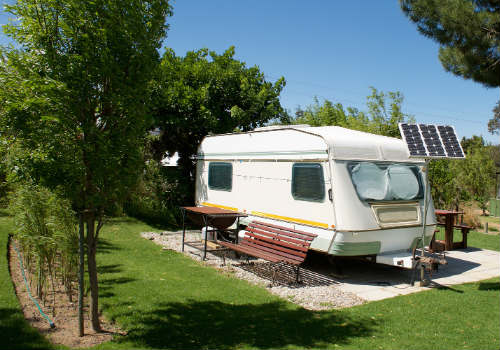
The excitement of travel, new experiences, and making new friends is a huge part of the RV lifestyle. The freedom of less stress and more time makes it easier to appreciate the little things. You get to save money and simplify your life, which for some makes long-term RV living seem like a dream come true.
There is a group of people just like me who are “over” home-ownership. We got to walk away from the problems of constant upkeep inside and outside of the home. The stress of having to pay the mortgage, taxes, and insurance while waiting for the roof to need replacement is something I will never miss.
I enjoy needing 15 minutes to clean the RV, not hours as it took in my old house. But I think all of us like the feeling of having something that is all ours, to do with as we wish. Paying rent every month to an RV park or campground that isn’t your style will get old fast.
When it seems like it’s becoming too expensive to stay full-time in a campground or you feel a bit claustrophobic when your neighbor is 10 feet away, the idea of your own land to park your RV begins to sound good. Some people have had enough of the stress of traveling the country in their RV and want to stay put.
Having the space of private property, yet keeping things simple as it is when living in an RV, seems like the best of both worlds. The problem arises when you forget some of the benefits of travel and staying in RV parks.
When you park permanently on your own property expect your view never to change. Unless your RV is self-contained and you can sporadically move the RV around your property, you will be stuck parking in the same position to hook up to the power and sewer.
When your 50-amp fuse blows, you can’t just call park maintenance to fix it; it’s all on you now. You also may miss meeting new people from all over the world, having a convenient laundry room to wash your clothes, a swimming pool, or a safe shelter to go to when the weather gets bad.
You will also have to maintain your property which may involve mowing the lawn or raking leaves. Expect to put in the time to keep things looking good, because you won’t have campground staff to do it for you.
You can’t forget the biggest concern, which is having a piece of land in a location with temperate weather. Most full-time RVers move about to avoid weather extremes.
If your property is in an area that can receive snow or freezing weather, you will need to prepare for that by keeping plenty of propane on hand. You may need to build a cover over your camper to help regulate the heat from the sun. Hot or cold, an RV can be very unpleasant if you aren’t ready for it.
Conclusion
I wish I could tell you that there were no restrictions on camping in your backyard. I wish I could tell you that rules for parking on your property in your RV were the same everywhere across this country.
Unfortunately, every state, county, and town will have its own rules and regulations in regards to parking an RV to live in full-time. Only research on your part will locate the right place for you.
I hope this guide gives you a better understanding of what the regulations are and the places you need to look for private property to park your RV.
Did you buy land only to find you couldn’t park your RV on it? Share your story and help educate the RV community on this vital issue!


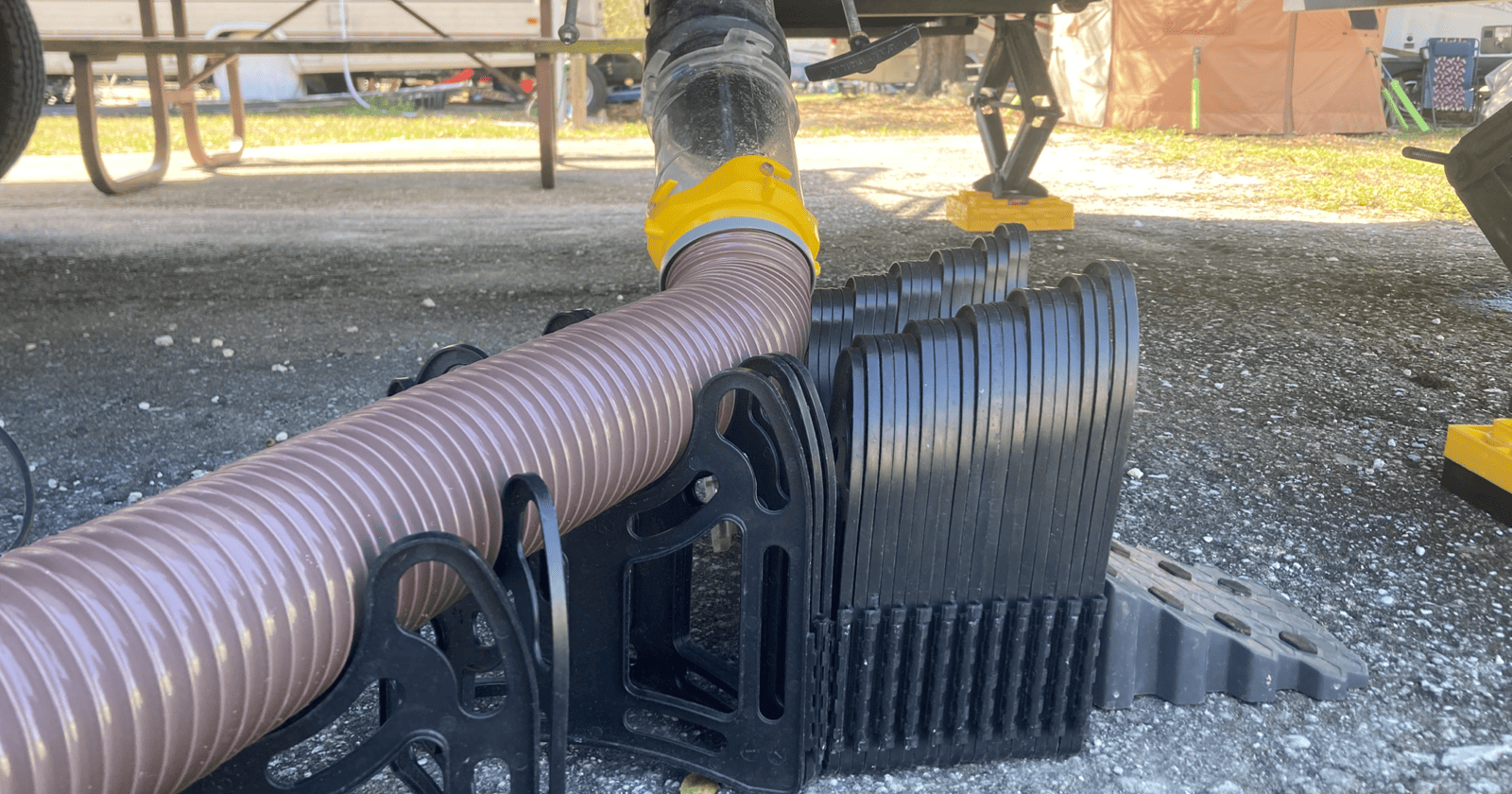

I found your internet site from Google as well as I need to state it
was a great find. Many thanks!
Appreciate your article, it explained what I needed to know. I just started looking up info on this subject and was having a hard time finding it. Thanks so much for writing about your experience and knowledge!